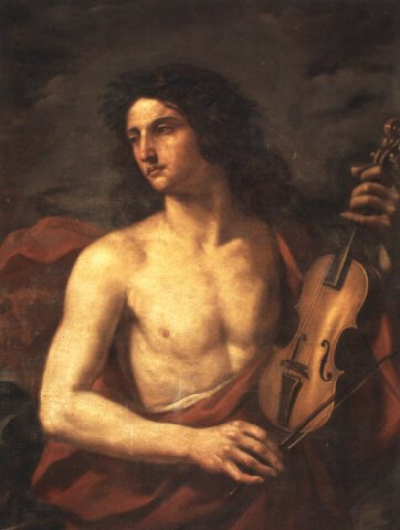Claudio Giovanni Antonio Monteverdi (baptized 15 May 1567 29 November 1643) was an Italian composer, string player, choirmaster, and priest. A composer of both secular and sacred music, and a pioneer in the development of opera, he is considered a crucial transitional figure between the Renaissance and Baroque periods of music history.
Born in Cremona, where he undertook his first musical studies and compositions, Monteverdi developed his career first at the court of Mantua (c.15901613) and then until his death in the Republic of Venice where he was maestro di cappella at the basilica of San Marco. His surviving letters give insight into the life of a professional musician in Italy of the period, including problems of income, patronage and politics.
Much of Monteverdi's output, including many stage works, has been lost. His surviving music includes nine books of madrigals, large-scale religious works, such as his Vespro della Beata Vergine (Vespers for the Blessed Virgin) of 1610, and three complete operas. His opera L'Orfeo (1607) is the earliest of the genre still widely performed; towards the end of his life he wrote works for Venice, including Il ritorno d'Ulisse in patria and L'incoronazione di Poppea.
While he worked extensively in the tradition of earlier Renaissance polyphony, as evidenced in his madrigals, he undertook great developments in form and melody, and began to employ the basso continuo technique, distinctive of the Baroque. No stranger to controversy, he defended his sometimes novel techniques as elements of a seconda pratica, contrasting with the more orthodox earlier style which he termed the prima pratica. Largely forgotten during the eighteenth and much of the nineteenth centuries, his works enjoyed a rediscovery around the beginning of the twentieth century. He is now established both as a significant influence in European musical history and as a composer whose works are regularly performed and recorded.
L'Orfeo (SV 318) (Italian pronunciation: [lorˈfɛːo]), sometimes called La favola d'Orfeo [la ˈfaːvola dorˈfɛːo], is a late Renaissance/early Baroque favola in musica, or opera, by Claudio Monteverdi, with a libretto by Alessandro Striggio. It is based on the Greek legend of Orpheus, and tells the story of his descent to Hades and his fruitless attempt to bring his dead bride Eurydice back to the living world. It was written in 1607 for a court performance during the annual Carnival at Mantua. While Jacopo Peri's Dafne is generally recognised as the first work in the opera genre, and the earliest surviving opera is Peri's Euridice, L'Orfeo is the earliest that is still regularly performed.
By the early 17th century the traditional intermedio—a musical sequence between the acts of a straight play—was evolving into the form of a complete musical drama or "opera". Monteverdi's L'Orfeo moved this process out of its experimental era and provided the first fully developed example of the new genre. After its initial performance the work was staged again in Mantua, and possibly in other Italian centres in the next few years. Its score was published by Monteverdi in 1609 and again in 1615. After the composer's death in 1643 the opera went unperformed for many years, and was largely forgotten until a revival of interest in the late 19th century led to a spate of modern editions and performances. At first these performances tended to be concert (unstaged) versions within institutes and music societies, but following the first modern dramatised performance in Paris, in 1911, the work began to be seen in theatres. After the Second World War many recordings were issued, and the opera was increasingly staged in opera houses, although some leading venues resisted it. In 2007, the quatercentenary of the premiere was celebrated by performances throughout the world.
In his published score Monteverdi lists around 41 instruments to be deployed, with distinct groups of instruments used to depict particular scenes and characters. Thus strings, harpsichords and recorders represent the pastoral fields of Thrace with their nymphs and shepherds, while heavy brass illustrates the underworld and its denizens. Composed at the point of transition from the Renaissance era to the Baroque, L'Orfeo employs all the resources then known within the art of music, with particularly daring use of polyphony. The work is not orchestrated as such; in the Renaissance tradition instrumentalists followed the composer's general instructions but were given considerable freedom to improvise.

1607Feb, 24
L'Orfeo by Claudio Monteverdi, one of the first works recognized as an opera, receives its première performance.
Choose Another Date
Events on 1607
- 30Jan
Bristol Channel floods, 1607
An estimated 200 square miles (51,800 ha) along the coasts of the Bristol Channel and Severn Estuary in England are destroyed by massive flooding, resulting in an estimated 2,000 deaths. - 24Feb
Claudio Monteverdi
L'Orfeo by Claudio Monteverdi, one of the first works recognized as an opera, receives its première performance. - 25Apr
Battle of Gibraltar (1607)
Eighty Years' War: The Dutch fleet destroys the anchored Spanish fleet at Gibraltar. - 5Oct
Paolo Sarpi
Assassins sent by Pope Paul V attempt to kill Venetian statesman and scientist Paolo Sarpi, who survives fifteen stiletto thrusts.

 English
English  español
español  français
français  português
português  русский
русский  العربية
العربية  简体中文
简体中文 